PROGRAM / PROGRAMME - 2012
09 May 2012
19:30-22:00 Opening ceremony, L'Entrepôt
Opening of the festival
Honorary president of the festival Yves Boisset
President of the Festival Jordan Plevnes
Minister of culture of Montenegro Branislav Micunovic,
President of the Jury Mr. Max Azoulay
Homage about Frédéric Rossif (August 14, 1922, Cetinje – April 18, 1990, Paris)
Honorary president of the festival Yves Boisset
President of the Festival Jordan Plevnes
Minister of culture of Montenegro Branislav Micunovic,
President of the Jury Mr. Max Azoulay
Homage about Frédéric Rossif (August 14, 1922, Cetinje – April 18, 1990, Paris)
"How I Was Stolen by the Germans", (Serbia), 140 min
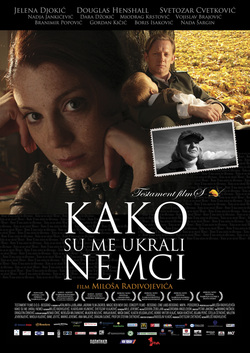
Director: Milos Radivojevic
How I Was Stolen by the Germans tells the story of Director and writer Milos Radivojevic‘s childhood and how his life was influenced by the people he grew up with. As a child he felt neglected by his communist family and was taken care of by a German officer, who occupied his home during the Second World War and was the only person who offered him any love and warmth during his child-hood.
How I Was Stolen by the Germans tells the story of Director and writer Milos Radivojevic‘s childhood and how his life was influenced by the people he grew up with. As a child he felt neglected by his communist family and was taken care of by a German officer, who occupied his home during the Second World War and was the only person who offered him any love and warmth during his child-hood.
10 May 2012
Amphitheater Jean Renoir - ESRA Paris
10:00-11:30 SEE short, animated and documentary movies
- "Star Dust" (Serbia), Director: Vladimir Perovic
- "My tired father" (Bulgaria), Director: Maya Vitkova
- "Well of Adem" (Turkey), Director: Veysel Cihan Hizar
- "Entertainer" (Montenegro), Director: Ivan Salatic
- "Eccl. 5:7" (Bulgaria), Director: Kaloyan Nikolov, Lyubomira Kostova
- "The Gift" (Bulgaria), Director: Sava Komitski
- "White Dove", (Bulgaria), Director: Galina Vasileva
- "My Son, a Sexual Maniac" (Slovenia), Goran Vojnovic
- "Mezanin" (Croatia), Director: Dalibor Matanic
11:30-13:00 "I Know I had a better title, but I forgot it", (Kosovo), 85'
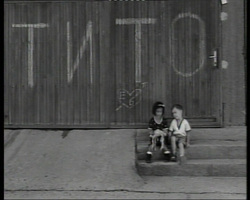
Director: Arben I. Kastrati
1996 – 1999…30 scenes in 30 years, one story told per year by the main character – Kosovar actor…
4 characters that mostly influenced the life of the young actor make an introduction of every scene (year) by answering differently on questions related to religion, work, politics, art, sex…Father had national answers, Mother had national and cosmopolitan answers, Teacher had balanced answers between national and ideological opinion, TV Speaker had official communist ideological answers …by discovering cinema at age 5 (“where American imperialist films were shown”), he discovers a different world, different from the world he was living…a window of his life…he discovers the will of the people to go to cinema to simply escape reality for two hours (even by paying tickets)…he decides to become an actor and live in USA (in a country where his “window” films were produced, to become a star and have his own picture on the cinema…in USA he discovers the importance of “time”…after his fathers death he returns back and struggles all his life to make a film with world wide success made from “roots”(homeland)…he passes thru difficulties by trying to find his identity in Former Yugoslavia…fall of communism, death of Yugoslavia, Bosnian war, Kosova war are the circumstances that made his film script changed by the events and never shoot (filmed)…this sad story’s are told with unique sense of humor…
1996 – 1999…30 scenes in 30 years, one story told per year by the main character – Kosovar actor…
4 characters that mostly influenced the life of the young actor make an introduction of every scene (year) by answering differently on questions related to religion, work, politics, art, sex…Father had national answers, Mother had national and cosmopolitan answers, Teacher had balanced answers between national and ideological opinion, TV Speaker had official communist ideological answers …by discovering cinema at age 5 (“where American imperialist films were shown”), he discovers a different world, different from the world he was living…a window of his life…he discovers the will of the people to go to cinema to simply escape reality for two hours (even by paying tickets)…he decides to become an actor and live in USA (in a country where his “window” films were produced, to become a star and have his own picture on the cinema…in USA he discovers the importance of “time”…after his fathers death he returns back and struggles all his life to make a film with world wide success made from “roots”(homeland)…he passes thru difficulties by trying to find his identity in Former Yugoslavia…fall of communism, death of Yugoslavia, Bosnian war, Kosova war are the circumstances that made his film script changed by the events and never shoot (filmed)…this sad story’s are told with unique sense of humor…
15:40-17:40 L'Entrepot
“Homage for Charlie Chaplin” (Kosovo), 10', dir. Orhan Kerkezi, Adem Rusinovici
"15 July" (Romania), 12', dir. Cristi Iftime
"15 July" (Romania), 12', dir. Cristi Iftime
“Belvedere” (Bosnia and Herzegovina), 90'
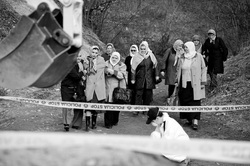
Director: Ahmed Imamovic
This is an intimate story of the survivors of Srebrenica genocide facing the world of contrasts. On one hand there is their relentless search for the truth while on the other there are trivialities of everyday realities of transitional society obsessed with reality shows used as a device to fabricate individuals characterized by superficiality. When these two worlds collide in a dysfunctional society a bomb starts its countdown.
This is an intimate story of the survivors of Srebrenica genocide facing the world of contrasts. On one hand there is their relentless search for the truth while on the other there are trivialities of everyday realities of transitional society obsessed with reality shows used as a device to fabricate individuals characterized by superficiality. When these two worlds collide in a dysfunctional society a bomb starts its countdown.
18:30-20:00 L'entrepot - Literary night “SEE a Paris – Paris a SEE”
Meeting between the French poets published in
SEE and the poets from SEE published in Paris.
Participants:
Nikolay Stoyanov, president of foundation Balkanika; Jean-Pierre Simeon; Aleksandar Prokopiev (winner of Balkanika award in 2011);
Mateja Bizjak Petit; Luan Rama; Alen Lance; Laure Combau; Francis Combes; Jean Pierre Rousseau.
Participants:
Nikolay Stoyanov, president of foundation Balkanika; Jean-Pierre Simeon; Aleksandar Prokopiev (winner of Balkanika award in 2011);
Mateja Bizjak Petit; Luan Rama; Alen Lance; Laure Combau; Francis Combes; Jean Pierre Rousseau.
20:00-22:00 L'Entrepot
"At the end of Trieste Street" (Slovenia), 52'
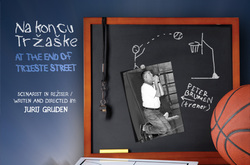
Director: Jurij Gruden
A combatant and a specialist in marginalized groups work. The man who took the lead of Slovenian deaf men's basketball team for the world summit and the central figure of basketball of Slovenian minority in Italy.
Accurate observer, who drags out the best abilities of every player.
Vision of the values and coach-philosophy out of the sports frames and vision of his life and work between victory and defeat.
A combatant and a specialist in marginalized groups work. The man who took the lead of Slovenian deaf men's basketball team for the world summit and the central figure of basketball of Slovenian minority in Italy.
Accurate observer, who drags out the best abilities of every player.
Vision of the values and coach-philosophy out of the sports frames and vision of his life and work between victory and defeat.
"Daddy" (Croatia), 70'
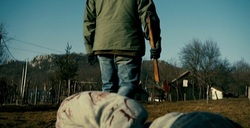
Director: Dalibor Matanic
Some family secrets should better stay secrets.
A girl talks her boyfriend and her sister into traveling to the Lika backwoods. Their father, who abandoned the family years ago, lives there. Having found out that he is ill, this is the daughter's last chance to have a talk with her father about everything that happened in the past. In the isolated horizons of Lika, the once deeply hidden dark family secrets start being revealed...
Some family secrets should better stay secrets.
A girl talks her boyfriend and her sister into traveling to the Lika backwoods. Their father, who abandoned the family years ago, lives there. Having found out that he is ill, this is the daughter's last chance to have a talk with her father about everything that happened in the past. In the isolated horizons of Lika, the once deeply hidden dark family secrets start being revealed...
11 May 2012
Amphitheater Jean Renoir - ESRA Paris
10:00-12:00 "Little Night Fairy Tale" (Bulgaria), 115'
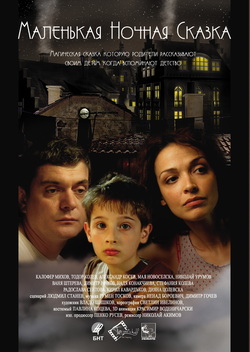
Director: Nikolay Akimov
Little Misho lives alone with his father in a house full of tennants. His father works in a hospital and every evening is very busy. So, every evening at the attic where they live, comes a different tennant, telling a good night story to the little boy. Misho dreams all the stories and the heroes in his fancy world are the real tennants. At the same time the greatest dream of the boy is his mother to come back. She is a piano player and Misho decides that if he buys a piano for her she would come back.
Little Misho lives alone with his father in a house full of tennants. His father works in a hospital and every evening is very busy. So, every evening at the attic where they live, comes a different tennant, telling a good night story to the little boy. Misho dreams all the stories and the heroes in his fancy world are the real tennants. At the same time the greatest dream of the boy is his mother to come back. She is a piano player and Misho decides that if he buys a piano for her she would come back.
12:00-13:00 Balkan authors from World Universities
- "Time of the wave" (Macedonia/Japan), Director: Andrijana Cvetkovic
- "High anxiety" (France/Montenegro), Director: Altinai Petrovic Njegos
- "Little fighters" (Switzerland/Bosnia and Herzegovina), Director: Ivana Lalovic
- "Iliriana" (Netherlands/Kosovo), Director: Ernest Meholli
13:00-14.30 SEE short, animated and documentary movies
- "Alarm" (Macedonia), Director: Ana Aleksovska
- "The Wedding tape" (Kosovo), Director: Ariel Shaban
- "Macedonians in Istanbul" (Macedonia), Director: Elizabeta Koneska
- "Paradox" (Turkey), Director: Emre Cilasin
- "Trip" (Bulgaria), Director: Radostina Neykova, Vladislav Budinov
- "The Red Apple 3" (Kosovo), Director: Mentor Berisha
- "REW Day", (Bulgaria), Director: Svilen Dimitrov
15:40-17:40 L'Entrepot
"Book" (Albania), 8'

Director: Elton Baxhaku, Eriona Çami
This is a film about the book. The art and the craft of making the object which has always been and is part of our life. Starting as a sheet of paper, it gets all the violence of the machinery, like press power, folding, cuttings and bindings, in order to be finalized as unity which encloses words. This unity is called “book”. But, what really makes the book a book? The “voice” of Stéphane Mallarmé narrates some of the answers of this question.
This is a film about the book. The art and the craft of making the object which has always been and is part of our life. Starting as a sheet of paper, it gets all the violence of the machinery, like press power, folding, cuttings and bindings, in order to be finalized as unity which encloses words. This unity is called “book”. But, what really makes the book a book? The “voice” of Stéphane Mallarmé narrates some of the answers of this question.
"Love.Net" (Bulgaria), 109'

Director: Ilian Djevelekov
LOVE.NET follows the parallel stories of a number of characters who are trying to change their lives via the Internet or are simply having fun online. This film is about love in all its forms - about the inevitable, mystic and inexplicable love, but also the superficial love of fast liquidity. Love at first virtual sight!
LOVE.NET follows the parallel stories of a number of characters who are trying to change their lives via the Internet or are simply having fun online. This film is about love in all its forms - about the inevitable, mystic and inexplicable love, but also the superficial love of fast liquidity. Love at first virtual sight!
20:00-22:00 L'Entrepot
"Local Vampire" (Montenegro), 110'

Director: Branko Baletić
The mother announces the false death of her son in order to save him from the gambling debts. The son is hiding and goes out at night as a vampire intended to take revenge upon his opposits, and the suitors of his mother and his widow... The film contains the elements of action, erotics and horror, but basically it's a comedy about individuals cought in transition of society and economy.
The mother announces the false death of her son in order to save him from the gambling debts. The son is hiding and goes out at night as a vampire intended to take revenge upon his opposits, and the suitors of his mother and his widow... The film contains the elements of action, erotics and horror, but basically it's a comedy about individuals cought in transition of society and economy.
12 May 2012
10:00-11:30 L'Entrepot
"The City of Children" (Greece), 96'
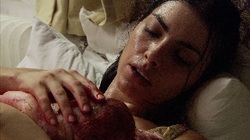
Director: Giorgos Gikapeppas
The arrival of children, as seen through the stories of four different couples, just when a pregnancy comes along and conflicts with their lives. A marital crisis becomes a family tragedy; a mad man’s gun forces a young couple to reconsider a premature pregnancy; a long struggle of in-vitro fertilization brings together and forces apart two sterile women who have shared the same man; and a young Iraqi immigrant, all alone in her apartment, is forced to give birth to her child with the help of her Greek stalker and next door neighbor. The stories unfold within a day and collide in a violent and fatal incident.
The arrival of children, as seen through the stories of four different couples, just when a pregnancy comes along and conflicts with their lives. A marital crisis becomes a family tragedy; a mad man’s gun forces a young couple to reconsider a premature pregnancy; a long struggle of in-vitro fertilization brings together and forces apart two sterile women who have shared the same man; and a young Iraqi immigrant, all alone in her apartment, is forced to give birth to her child with the help of her Greek stalker and next door neighbor. The stories unfold within a day and collide in a violent and fatal incident.
11:30-13:00 L'Entrepot
"This is not American movie" (Macedonia) 90'
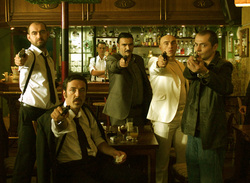
Director: Sasho Pavlovski
A gang of small time criminals are trying to make their lives more interesting and more relevant – into something that fits their ideal of life inside an American film. But, of course, they are not in an American film, and are doomed to fail in all their efforts to live in such a way. Their efforts are so extreme and ridiculous that their actions even impact the structure of the narrative they actually do live inside, creating further errors that the gang members cannot properly act out (and not even allowed in American films) thus compounding their ineffectiveness. But through their futility, the members of this gang reveal themselves to be funny, human and real. And this is the story of the film’s protagonist, the Boss, who more than anything wants his life to have meaning, to be just like „an American film.“ He is someone who in a small limited way has mastered some of the rules of American film making and story-telling, but not to the extent that he can have a significant impact. When he learns that he is dying, he makes one final effort to make his life just as glorious as an American film – by conducting a heist with daring in the best traditions of an American gangster movie. But because his motley grew of would-be film experts and other surprise guests are not capable of acting it out, (and because real American filmmakers will complicate his plans) his scenario will not develop as hoped. But, even in his failure, the Boss finds unexpected success, and thus finds meaning in his life, even if it is not an American Movie.
A gang of small time criminals are trying to make their lives more interesting and more relevant – into something that fits their ideal of life inside an American film. But, of course, they are not in an American film, and are doomed to fail in all their efforts to live in such a way. Their efforts are so extreme and ridiculous that their actions even impact the structure of the narrative they actually do live inside, creating further errors that the gang members cannot properly act out (and not even allowed in American films) thus compounding their ineffectiveness. But through their futility, the members of this gang reveal themselves to be funny, human and real. And this is the story of the film’s protagonist, the Boss, who more than anything wants his life to have meaning, to be just like „an American film.“ He is someone who in a small limited way has mastered some of the rules of American film making and story-telling, but not to the extent that he can have a significant impact. When he learns that he is dying, he makes one final effort to make his life just as glorious as an American film – by conducting a heist with daring in the best traditions of an American gangster movie. But because his motley grew of would-be film experts and other surprise guests are not capable of acting it out, (and because real American filmmakers will complicate his plans) his scenario will not develop as hoped. But, even in his failure, the Boss finds unexpected success, and thus finds meaning in his life, even if it is not an American Movie.
18:00-20:00 L'Entrepot
"Sarah The Myth" (Macedonia), 13'
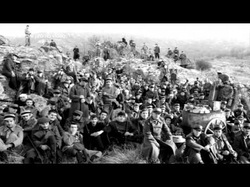
Director: Sasha Stanisic
The movie "The Myth of Sarah" is a short story about one historical dilemma - the arrival of the famous French actress Sarah Bernhard in Bitola in the midst of the First World War, when this place was the centre of Front Arena. The story begins with the arrival of Sarah Bernhard in Bitola in August 1916. She comes here to entertain French troops and to see her lover, a French general who is one of the commanders on the French Army. Mrs Bernhard is at that time about seventy years old, stays in Bitola only one day and one night. On the stage where she entertains the soldiers, she expresses her dilemma and bitterness. Sarah speaks the monologue from Shakespeare's Hamlet. Sara's monologue tries to show the superiority of the human spirit and virtue, against the twilight of civilization. Combining archival materials with a story that happens today, we attempt to acknowledge some senseless human activities which are following the civilization.
The movie "The Myth of Sarah" is a short story about one historical dilemma - the arrival of the famous French actress Sarah Bernhard in Bitola in the midst of the First World War, when this place was the centre of Front Arena. The story begins with the arrival of Sarah Bernhard in Bitola in August 1916. She comes here to entertain French troops and to see her lover, a French general who is one of the commanders on the French Army. Mrs Bernhard is at that time about seventy years old, stays in Bitola only one day and one night. On the stage where she entertains the soldiers, she expresses her dilemma and bitterness. Sarah speaks the monologue from Shakespeare's Hamlet. Sara's monologue tries to show the superiority of the human spirit and virtue, against the twilight of civilization. Combining archival materials with a story that happens today, we attempt to acknowledge some senseless human activities which are following the civilization.
"POMEGRANATE" (Turkye), 70'
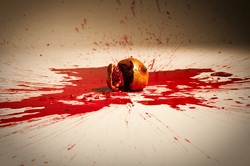
Director: Ümit Ünal
We all differ from each other like pomegranate seeds: We are both similar and distinct yet we are still like a whole pomegranate. It is the crust of faith that keeps us together, the faith that we have for each other.
But, what if the crust cracks… What if we doubt everything and our trust in each other… What if we lose our sense of justice… What if we seek our own justice…
Won't the seeds scatter everywhere like a cracked pomegranate?
“The Pomegranate” tells the story of a woman; seeking her own justice.
“The Pomegranate” questions the justice of four people with different beliefs in a house, in half a day and in their own realms of faith.
We all differ from each other like pomegranate seeds: We are both similar and distinct yet we are still like a whole pomegranate. It is the crust of faith that keeps us together, the faith that we have for each other.
But, what if the crust cracks… What if we doubt everything and our trust in each other… What if we lose our sense of justice… What if we seek our own justice…
Won't the seeds scatter everywhere like a cracked pomegranate?
“The Pomegranate” tells the story of a woman; seeking her own justice.
“The Pomegranate” questions the justice of four people with different beliefs in a house, in half a day and in their own realms of faith.
20:00-22:00 Amphitheater Jean Renoire - ESRA Paris
Closing Ceremony
Announcing of the prizes by Mr. Max Azoulay, President of Jury
Concert of:
- Aleksandar Stefanoski, Tenor
- Nino Velichkovski & Kumanovski Tamburashi
Concert of:
- Aleksandar Stefanoski, Tenor
- Nino Velichkovski & Kumanovski Tamburashi
